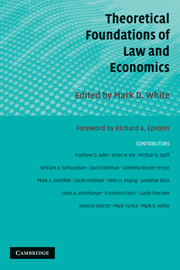Book contents
- Frontmatter
- Contents
- Foreword
- Preface
- Notes on Contributors
- PART ONE THE ROLE AND USE OF ECONOMICS IN LEGAL STUDIES
- PART TWO EFFICIENCY
- PART THREE RATIONALITY AND THE LAW
- PART FOUR VALUES AND ETHICS IN CIVIL AND CRIMINAL LAW
- 11 Law and Economics and Explanation in Contract Law
- 12 Welfare, Autonomy, and Contractual Freedom
- 13 Efficiency, Fairness, and the Economic Analysis of Tort Law
- 14 Retributivism in a World of Scarcity
- Index
- References
11 - Law and Economics and Explanation in Contract Law
Published online by Cambridge University Press: 06 July 2009
- Frontmatter
- Contents
- Foreword
- Preface
- Notes on Contributors
- PART ONE THE ROLE AND USE OF ECONOMICS IN LEGAL STUDIES
- PART TWO EFFICIENCY
- PART THREE RATIONALITY AND THE LAW
- PART FOUR VALUES AND ETHICS IN CIVIL AND CRIMINAL LAW
- 11 Law and Economics and Explanation in Contract Law
- 12 Welfare, Autonomy, and Contractual Freedom
- 13 Efficiency, Fairness, and the Economic Analysis of Tort Law
- 14 Retributivism in a World of Scarcity
- Index
- References
Summary
INTRODUCTION
Law-and-economics scholars have offered theories that purport to compete with other theories of law, and with other theories of particular doctrinal areas of law. This chapter will explore what it means to have a theory of a particular area of law, using contract law as an example, and will then consider the way in which law-and-economics theories succeed or fail in explaining contract law.
Section I offers a brief overview of the problems and possibilities inherent in theories about a doctrinal area of law (like contract law). Section II addresses the question of whether theories are or should be general and universal rather than particular. Section III introduces the law-and-economics approach, and section IV discusses the role of historical or causal explanation, both in general theorizing about doctrinal areas and in the law-and-economics approach. Section V looks at some less ambitious variations of doctrinal theories from law-and-economics writers, and section VI outlines some critiques and responses to the law-and-economics approach.
THEORIES, EXPLANATION, AND JUSTIFICATION
What does it mean to have “a theory of law” or “a theory of contract law”? Such jurisprudential theories sit uneasily between theories of the humanities and theories of the social sciences. And theories of doctrinal areas do not obviously fit into the more familiar sorts of theories one finds from the physical sciences, declaring the certain causes and effects of objects in their interaction.
- Type
- Chapter
- Information
- Theoretical Foundations of Law and Economics , pp. 203 - 213Publisher: Cambridge University PressPrint publication year: 2008



